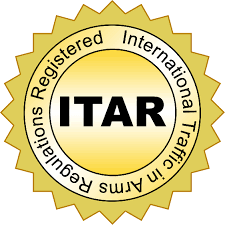
The International Traffic in Arms Regulations (ITAR) and the Export Administration Regulations (EAR) are two important United States export controls that affect the manufacture, sale, and distribution of certain technologies. These controls seek to limit access to specific types of technology and the associated data to prevent sensitive information from reaching a foreign national.
Violations of these controls can hurt your company’s bottom line, negatively impacting your exporting future, and often result in substantial civil and criminal penalties, including six-figure fines and even imprisonment. It is the responsibility of the manufacturer or exporter to take the necessary steps to certify that they are in compliance with these controls.
Businesses that are involved in manufacturing, product development, or high-technology research are considered potential targets that can be exploited by foreign nationals resulting in non-compliance to the U.S. EXPORT CONTROL SYSTEM. If you export, or your customer exports what you sell to them as a sub-component of their product, you should be keenly aware of your responsibilities. Simply NOT knowing “what or how” your component is integrated in the supply chain to an end user is not an acceptable justification when a violation is discovered.
Since World War II, foreign adversaries of the United States have acquired large quantities of U.S. and western technology by various means, both legal and illegal. Such acquisitions have provided these countries with the fruits of U.S. research and strategic technology largely without cost, while compromising U.S. security and military superiority. In some instances, U.S. weapons and technology have been used against American soldiers, citizens and allies.
There are four major ways U.S. businesses can help stem the illegal flow of equipment, technology and munitions to unauthorized destinations:
- Identify inquiries and orders for production parts or technology that are likely to be shipped outside the United States, and ensure that these transactions are reviewed by export specialists.
- Ensure that your export specialists understand export controls and follow appropriate screening and licensing procedures.
- Make certain that employees—whether they live, travel or transmit information abroad, or merely come into contact with foreigners visiting the United States— fully understand that the U.S. government restricts the flow of certain technical data or know-how, whether in written, oral or visual form.
- Ensure that suspicious contacts are reported to Immigration and Customs Enforcement (ICE) as quickly as possible.
Here are some indicators that potential illegal export of your products may be occurring:
- The purchaser is reluctant to provide information about item’s end-use (you did ask, right?).
- A customer pays in cash or makes payments in excess of item’s market value.
- A shipping route is abnormal for the product and destination.
- A freight-forwarding firm is listed as final destination.
- An item does not correspond with customer’s line of business.
- A customer declines routine installation, training or maintenance services.
- A transaction just does not make sense.
It is important to have an independent annual review of your ITAR/ EAR compliance program by someone who is trained to understand the latest provisions of the law, and is trained to uncover programmatic gaps you may have missed. Insyte Consulting’s ITAR/ EAR Compliance partners are well versed in the latest procedures, regulations, and comprehensive compliance program’s. Contact INSYTE CONSULTING today to schedule a conversation and learn about your potential exposure and resolve any gaps in your compliance that may exist… Whether you know about them or not.

